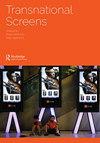Childhood, animality and emotions in indonesian film director Edwin’s Babi buta yang ingin terbang/Blind Pig Wants to Fly (2008)
IF 0.5
0 FILM, RADIO, TELEVISION
引用次数: 3
Abstract
ABSTRACT This article looks at the ways childhood, animality and emotions are imbricated in the Chinese Indonesian film director Edwin’s film: Babi buta yang ingin terbang/Blind Pig Who Wants to Fly (2008). By examining their entanglement, it demonstrates how the director’s use of childhood as a trope of becoming externalises the complex configuration of emotions embodied by Chinese in Indonesia. Further, this article explores this configuration as the subjective dimension of Sinophobia, here approached as the historical process of positioning Chinese Indonesians as an object of national disgust. Complementing this analysis, this article also examines Edwin’s employment of a pig-imaginary to visually convey the affective effects of contemporary racism in Indonesia. This article concludes arguing that, by employing both childhood and animality, Blind Pig effectively troubles what Chineseness is by means of visualising how it feels from the embodied perspective of a minoritised diasporic subject.印尼电影导演埃德温·布塔·杨金邦/《盲猪想飞》(2008)中的童年、动物和情感
本文着眼于印尼华裔电影导演埃德温的电影《想飞的盲猪》(2008)中,童年、动物和情感是如何交织在一起的。通过审视他们之间的纠葛,影片展示了导演如何将童年作为成长的隐喻,将印尼华人所体现的复杂情感结构外化。此外,本文探讨了这种配置作为恐华症的主观维度,这里是作为将印尼华人定位为国家厌恶对象的历史过程来探讨的。作为对这一分析的补充,本文还考察了埃德温运用猪的想象来直观地传达印度尼西亚当代种族主义的情感影响。这篇文章的结论是,通过运用童年和动物,《盲猪》从一个少数流散主体的具体视角,通过视觉化它的感受,有效地探究了中国性是什么。
本文章由计算机程序翻译,如有差异,请以英文原文为准。
求助全文
约1分钟内获得全文
求助全文
来源期刊

Transnational Screens
Arts and Humanities-Visual Arts and Performing Arts
CiteScore
0.60
自引率
0.00%
发文量
23
 求助内容:
求助内容: 应助结果提醒方式:
应助结果提醒方式:


